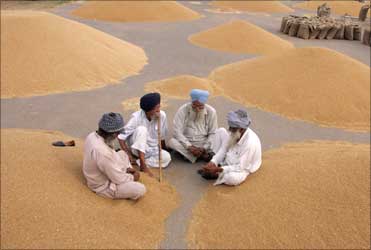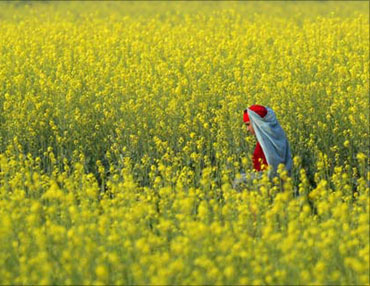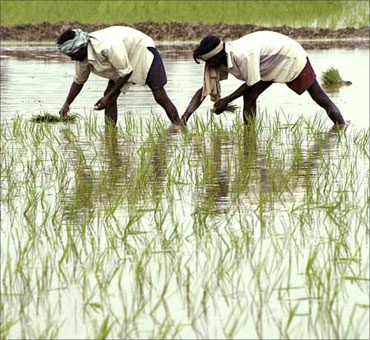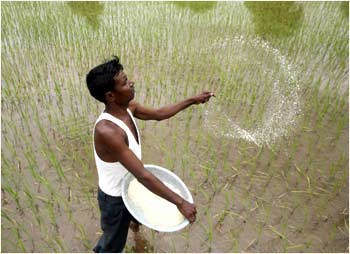Photographs: Ajay Verma/Reuters Devika Banerji & Ajay Modi in New Delhi
The National Advisory Council recommendation to guarantee foodgrain to two-thirds of the country's population could bloat the government's food subsidy spend by 26 per cent to over Rs 72,000 crore (Rs 720 billion) -- equivalent to over 1 per cent of the gross domestic product.
The foodgrain guarantee is part of the proposed National Food Security Bill.
This is a conservative figure, compared with the Rs 78,000 crore (Rs 780 billion) estimated by Deutsche Bank in a recent research report.
The Centre's food subsidy bill in 2009-10 was estimated at Rs 55,600 crore (Rs 556 billion).
. . .
Food security to cost Rs 72,000 crore
Photographs: Reuters
The Rs 72,000-crore estimate is based on the agriculture ministry's calculation of 97 million families in the 'priority' category and 89 million families in the 'general' category.
The cost of the food security legislation is based on subsidy levels for wheat and rice in 2009-10.
It has been adjusted for the increase in minimum support price for the foodgrain during the current year. It also takes into consideration the outgo for subsidising millets, according to the new recommendations.
| HUNGRY FOR FUNDS Subsidy impact of food security | ||
| Allotment (million tonne)* | Total annual subsidy required (Rs crore) | |
| Priority category | 40.7 | 50,633 |
| General category | 21.4 | 21,701 |
Over and above this, the government will have to bear the cost of supplying grain to the poorest sections of society under the Antyodaya Anna Yojna and other welfare schemes.
. . .
Food security to cost Rs 72,000 crore
The priority category will be entitled to 35 kg of wheat, rice and millets at Rs 2, Rs 3 and Rs 1 a kg, respectively. General households will be entitled to 20 kg at a price not exceeding half the minimum support price.
The two categories together would require 62.1 million tonnes of foodgrain, annually, Agriculture & Food Minister Sharad Pawar had said on Wednesday.
That is more than the record government procurement of 56.83 million tonnes in 2009-10.
. . .
Food security to cost Rs 72,000 crore
Photographs: Reuters
"The cumulative impact (of the subsidies) could put substantial strain on the fiscal position, especially given the fact that revenue generating tax reforms such as the direct taxes code and goods & services tax will not be implemented next fiscal," stated Deutsche Bank's research note.
Agricultural analysts are also questioning the viability of the food security legislation recommended by NAC.
"It would be difficult to produce such huge quantities and the government will have to crowd out the entire private sector from procurement.
That is going to be a major challenge," said Ashok Gulati, Asia director of the International Food Policy Research Institute.
"I don't think there is any country that commits to procurement and distribution of such large quantities," he added.






article